Hi Everyone,
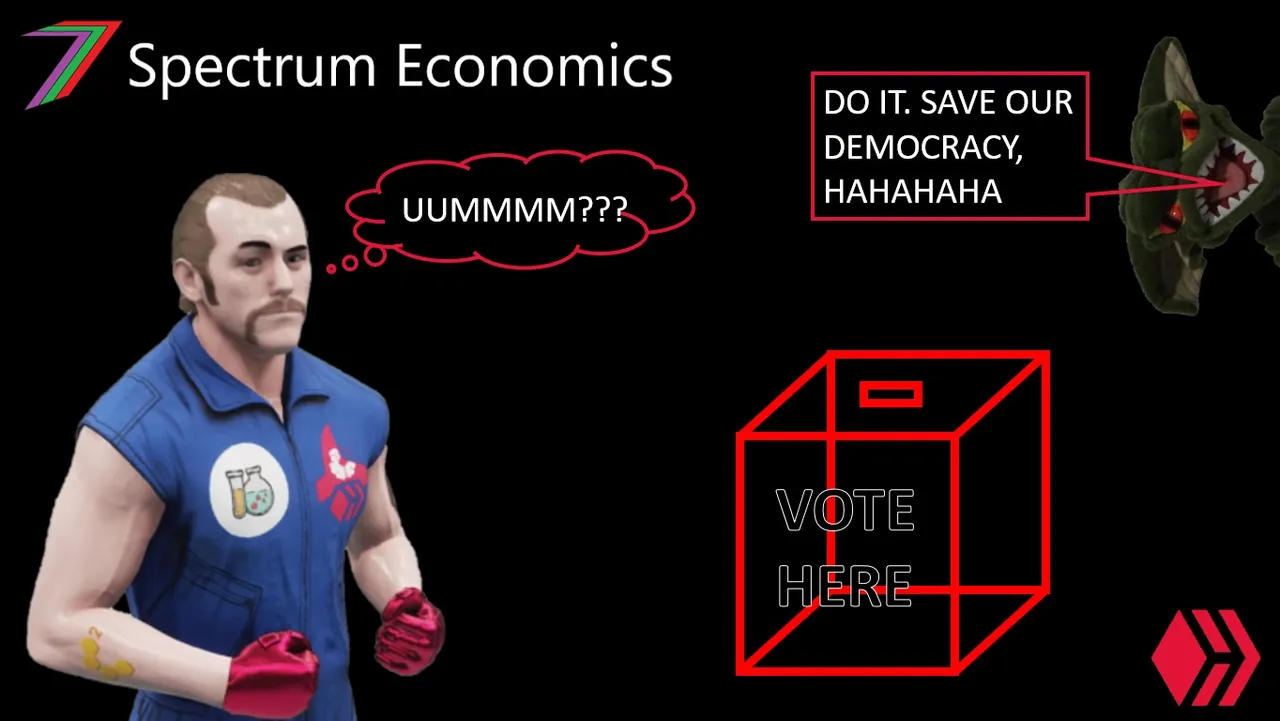
I have little confidence in Governments and political systems. Whoever or whatever party is elected to office follow the same decision-making processes, use the same logic, and eventually produce the same undesirable outcomes. Therefore, participating in the election process under the current systems serves no useful purpose. For an explanation of my arguments, I suggest you read my posts Raise your hand if you live in a Democracy, Could democracy succeed if it was given a chance?, and Power, Money and Me Me Me.
In this post, I want to discuss what needs to happen before I will conscientiously vote in an election. I’m a citizen of both the UK and Australia. I do not vote in the UK and I choose to spoil my vote in Australia (they have compulsory voting which I strongly oppose).
Gradual Process
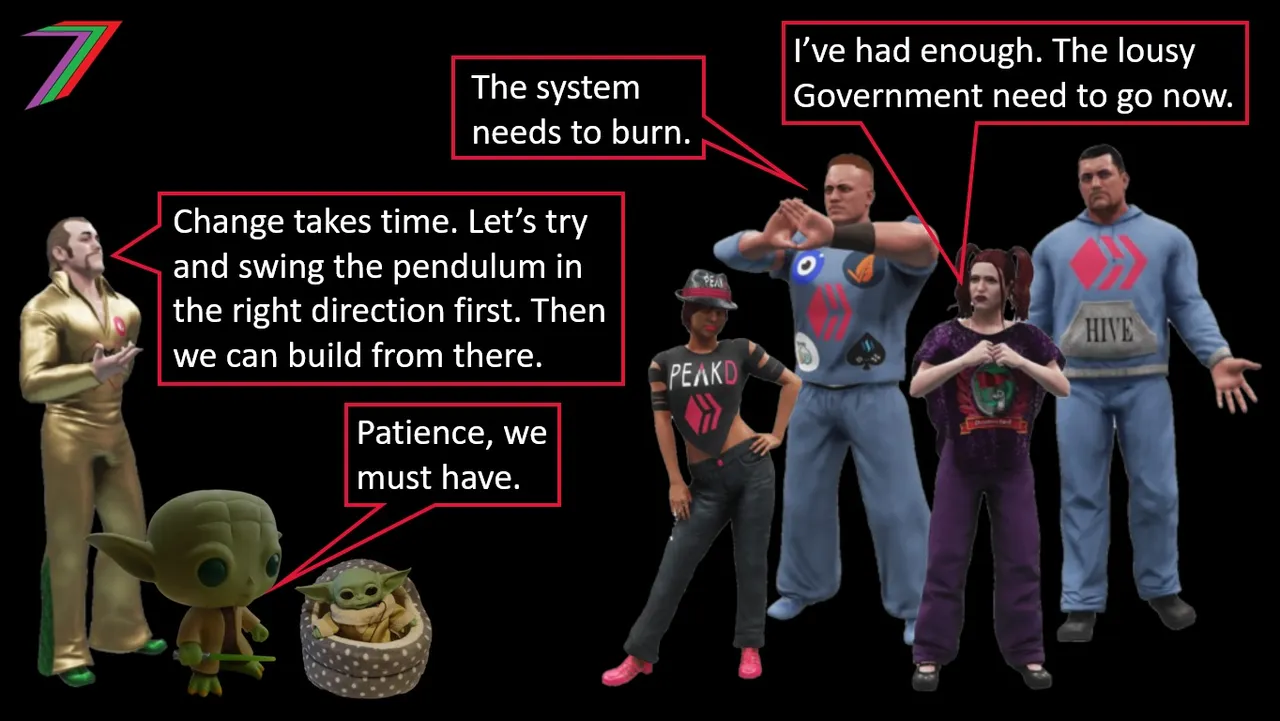
The political systems in both the UK and Australia are seriously broken. The people in the systems have no desire to make significant changes to them because they benefit from how they currently work. The systems are not going to change based on actions initiated from the people working in prominent positions within it. Pressure needs to come from the outside. This pressure can take many forms such as protests, strike action, not participating in the election process, and many other forms of noncompliance. This pressure needs to be directed at changes that will improve the system, can gain substantial support from the people, and can be plausibly implemented by an existing Government.
Areas that can be targeted to set change in motion
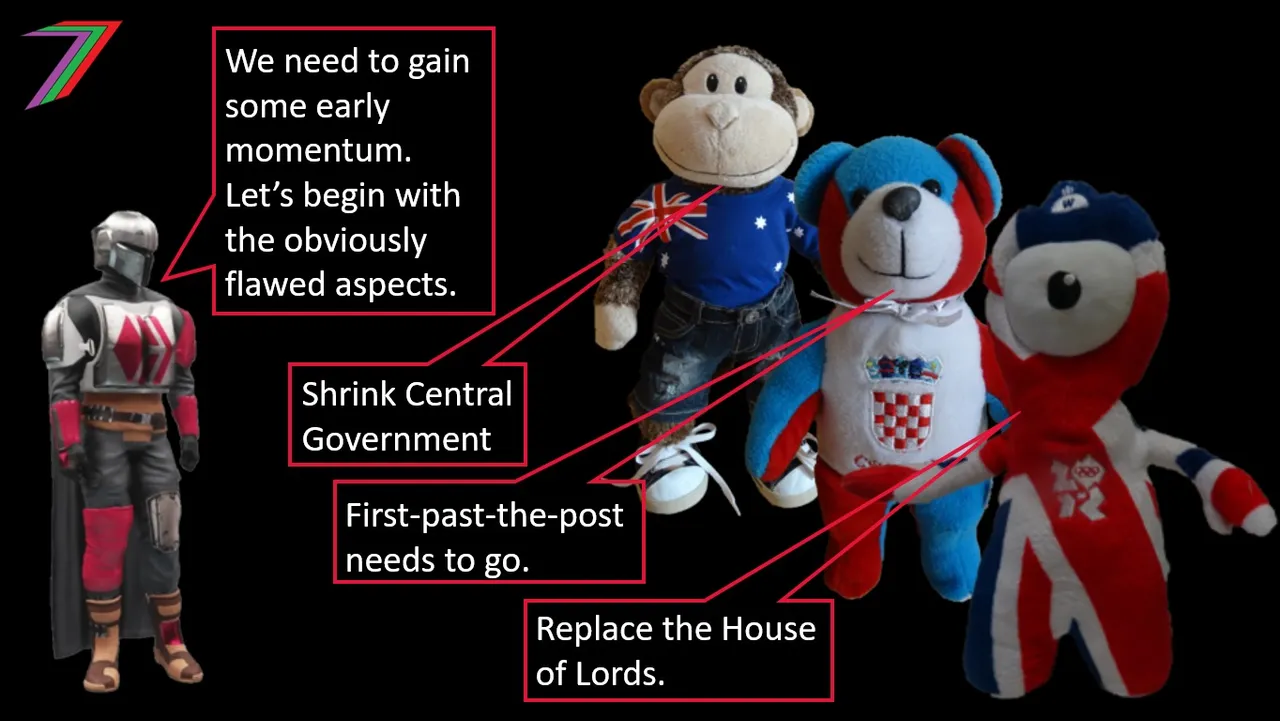
In my posts, Blockchain Government – Part 1: Breaking Down the Existing System and Blockchain Government – Part 2: Leadership from the Blockchain, I outline how I believe governance can be improved by dismantling the existing systems and replacing them with decentralised systems that uses blockchain technology to efficiently pool information and ideas from multiple sources. The first post explained what needed to be removed or changed within the existing systems before a new decentralised system could have an opportunity to thrive. Below are a few of the main changes recommended in that post. I have reordered them according to what I believe could most likely be achieved.
This is just one possible approach. If such a revolution were to occur, it would most likely happen quite differently but this post is more about demonstrating a possible logical progression as well as how it would alter my views regarding voting in elections.
- Change voting system (e.g. Condorcet and Borda Count Voting Systems)
- Replace House of Lords (UK Government) with elected representatives
- Reduction in size and power of Central Governments
- Abolish parties and party systems
- Equal opportunity for exposure for candidates
- Reduced role and permanence of representative democracy and positions
The above changes would be considered radical and undesirable to most in Government if viewed as a list. However, if they are approached individually and in order, there is a possibility for some success as the arguments can logically progress to the next point.
Voting System
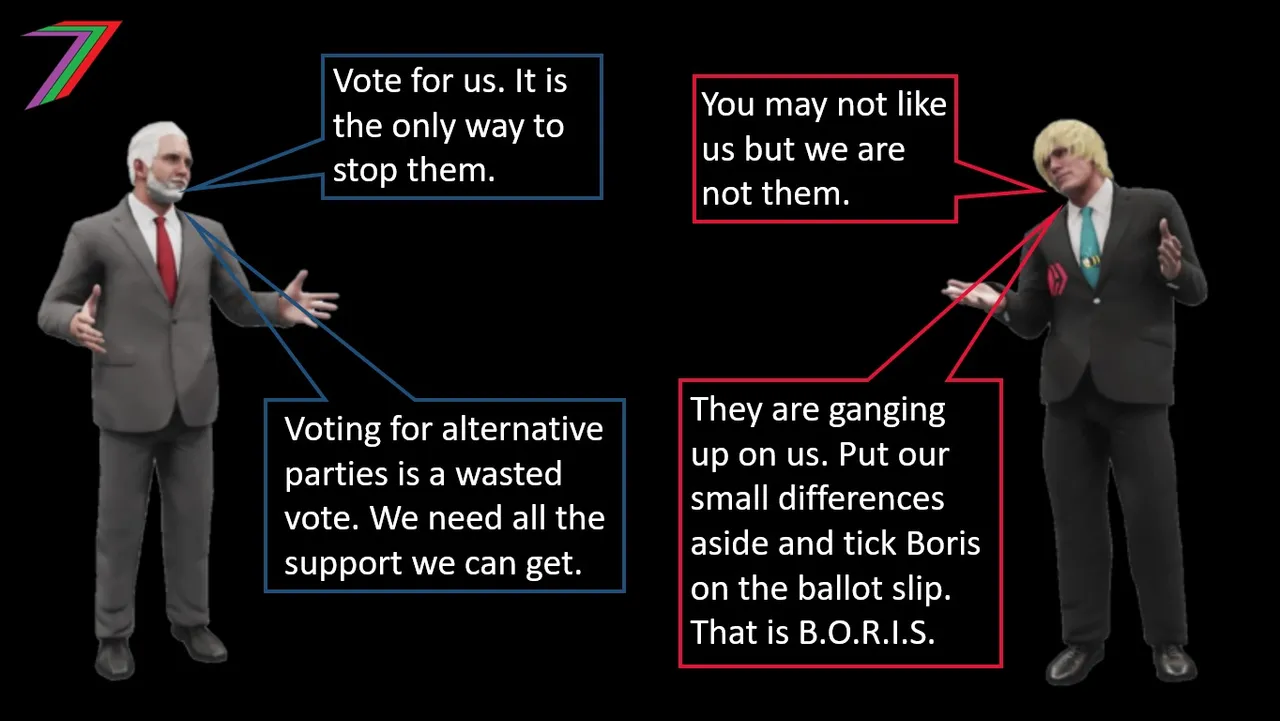
The UK uses a first-past-the-post voting system and Australia uses an instant-runoff preferential voting system. The first-past-the-post voting system is very simple. The candidate with the most votes wins. Instant-runoff preferential voting system is a little more complex. Voters rank the candidates from most to least preferred. If a candidate obtains more than 50% of the vote he or she wins. If not, the candidate with the lowest share of the votes is eliminated and the second preferences are allocated to the remaining candidates. This process continues until a candidate obtains more than 50% of the votes.
The first-past-the-post voting system is one of the worst systems in the world. It strongly facilitates the two-party political structure. This occurs because of vote splitting as the number of parties increase. This gives the party with the most divergent views from the rest an advantage as most of their supporters are unlikely to vote for other parties. This party could win the election even though they do not have the support or represent a very large proportion of the people. To prevent this outcome, people support the party they think has the best chance of stopping them from winning. This leads to only two parties receiving the majority of votes.
The instant-runoff preferential voting system appears far superior to the first-past-the-post voting system. It allows people to rank their candidates, so that they can still support alternative candidates without feeling forced to switch support to a more popular candidate or party.
The instant-runoff preferential voting system is still greatly flawed. It requires voters to rank all candidates even though it is likely people may not have an opinion about a party or candidate or they may feel indifferent between some parties and candidates. The lower preferences votes (e.g. second, third, fourth ranked etc.) are weighted equally to first preferences after a candidate has been eliminated. The order of elimination of candidates affects when votes are passed to other candidates, this can affect the outcome of the election. The Australian system also allows parties to determine the ranking for voters which can be used to manipulate the results.
The arguments to change the UK’s first-past-the-post system are significantly stronger because the weaknesses of the system are obvious. It compares badly against any preferential voting system; therefore, it would be difficult to defend in a debate.
The preferential voting systems that could produce a fair and represented outcome are the Condorcet voting system and the Borda Count voting system. The Condorcet system compares each candidate against each other on a one-to-one basis. The candidate who wins the must one-to-one comparisons wins the election or seat. The Borda Count system allocates points based on ranking. For example, first preference awards 4 points, second preference 3 points and third preference 2 points. This targets the weaknesses of both the UK and Australian voting systems. My post, First-Past-The-Post Vs Preferential Voting Systems explains different types of voting systems.
The Australian voting system could be harder to change as it is a preferential voting system and differences may not appear significant to most people. Therefore, the push for change will be weaker. The instant-runoff preferential voting system could be compared with Condorcet and Borda Count Voting Systems using computer simulations to demonstrate how the results differ. These experiments could form the basis for arguments to change the systems. However, these simulations will not reflect the impact these voting systems have on the voter’s psychology; thus making the argument difficult. The best approach for change in Australia could be to argue against compulsory voting and change the existing system so that voters are not required to rank every candidate.
A change in or to voting systems would be a step in the right direction but that would not be sufficient for me to take the election process seriously.
Replace House of Lords (UK Government) with elected representatives
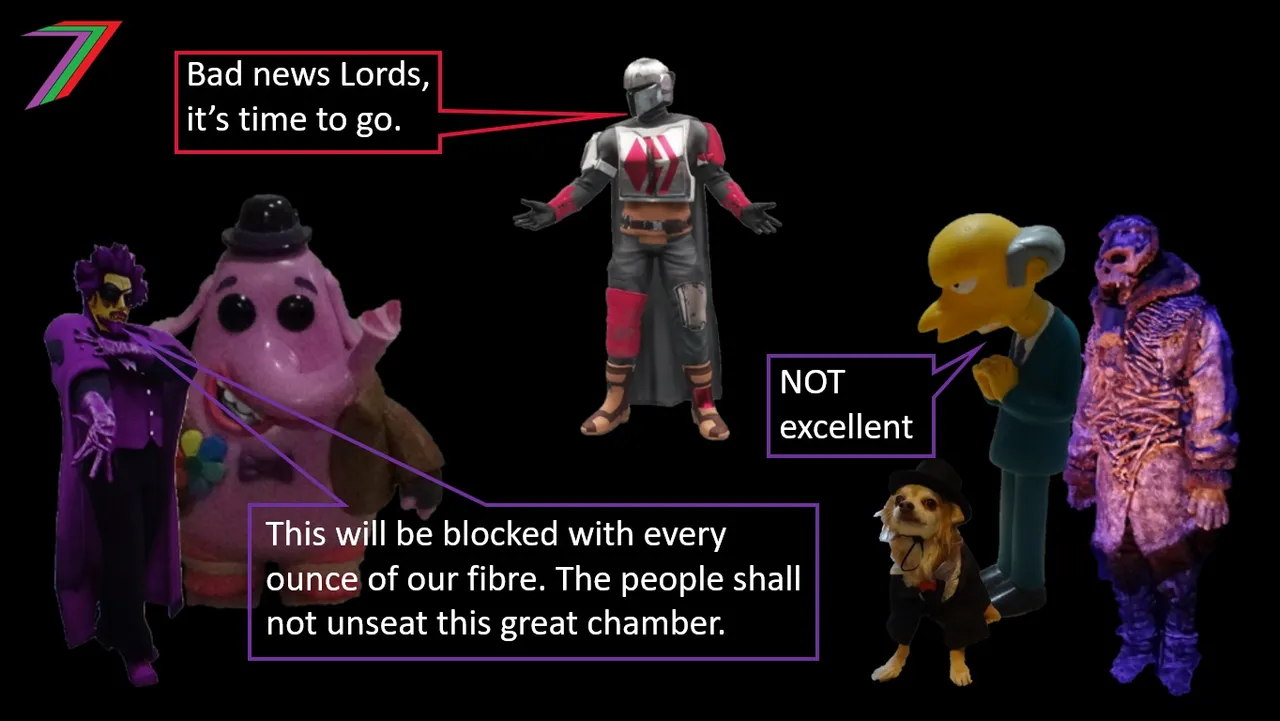
The House of Lords is the second chamber in the Legislative Branch in the UK parliament. The Lords are not elected but instead nominated by committee or awarded as part of tradition. These appointments are for life and they cannot be removed through public vote. Even though the Lords are not democratically elected, they play an important role in the passing of legislation. Most legislation (does not include bills in the Government’s manifesto) that passes through the House of Commons also passes through the House of Lords. It is considered a form of oversight. The House of Lords can hold legislation for up to a year and are allowed to make amendments to the proposed legislation. The amended legislation returns to the House of Commons where it is voted on again before it is signed off by the monarch.
Since the Lords are not elected their power has been reduced. This gives more power to the Government who are the Executive Branch and, if they hold a majority, they have control over the House of Commons, which is the only chamber that has significant power. Thus, results in a high concentration of power in the hands of just a few people.
Since the House of Lords do not have significant power and arguably should not, they should be replaced by elected officials who should be given more power and be able to reduce the power of the Government. The second chamber should consist of elected members who are not affiliated with any party (e.g. independent candidates). The election cycle should not coincide with the General Elections (e.g. at least 2 years after a General Election has been held). This is to reduce influence on the other chamber as well as account for changing sentiments.
A second legislative chamber for parliament consisting of members not affiliated with a party would be an important change. We would have representative oversight not directly influenced by party politics in the House of Commons. I would be tempted to participate in the election of these members.
Reduction in size and power of Central Governments
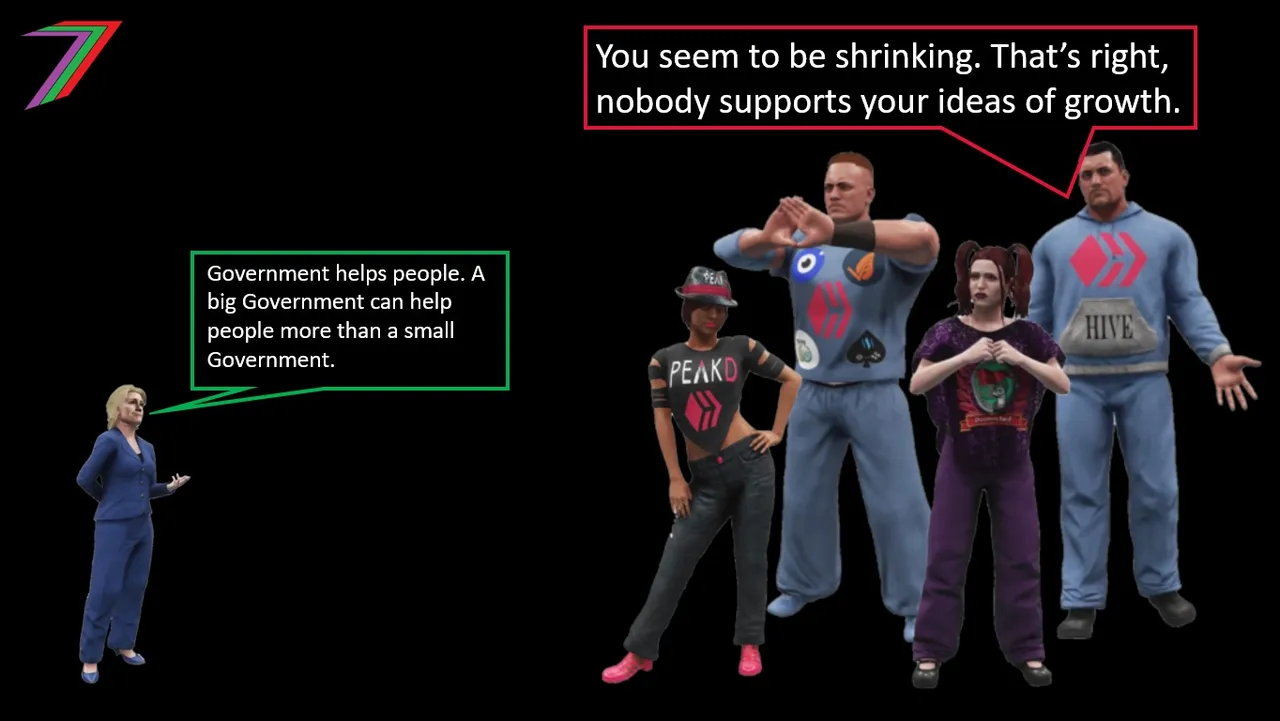
Both UK and Australian Governments are predominantly centralised with some illusion of decentralisation. UK has three Devolved Governments for the countries Wales, Scotland and Northern Ireland. Australia has State Governments for New South Wales, South Australia, Queensland, Western Australia, Victoria, and Tasmania and Territory Governments for Northern Territories, and Australian Capital Territory. The parties elected for the Central Governments are represented in the UK Devolved Government elections (only exception is Northern Ireland), and in Australia’s State and Territory elections.
For decentralisation to exist, the Devolved and State Governments need to be independent from the Central Governments. The parties running in the State and Devolved elections should be unaffiliated to the Central Government parties or be replaced by independent candidates. The latter would have greater potential for increasing decentralisation. England would also need to create its own decentralised Government for consistency with the other countries in the UK.
Central Governments need to pledge for less involvement in society and the economy. This would require less Government spending, reduction of taxes, and the eventual abolishment of income tax. Generally, free market forces are a more reliable determinant of meeting people’s needs and wants as well as a determinant of income.
Central Governments should begin to transition from a leadership role to a more administrative role. Decision-making should be delegated and eventually belong to the people closest to the decisions and to the people with the most knowledge (recognised through expert consensus and not Government). This could pave the way for the introduction of the blockchain to improve the efficiency of decentralised input into decisions (revisited later in post).
Increased decentralisation would be a huge step to improving governance. It provides more incentive to vote in electing officials at various levels as well as for key decision-makers. It also provides motivation to offer direct input into problem identification. I would participate in elections at local levels as well as contribute to the feedback loop in regards to local problems.
Abolish parties and party systems
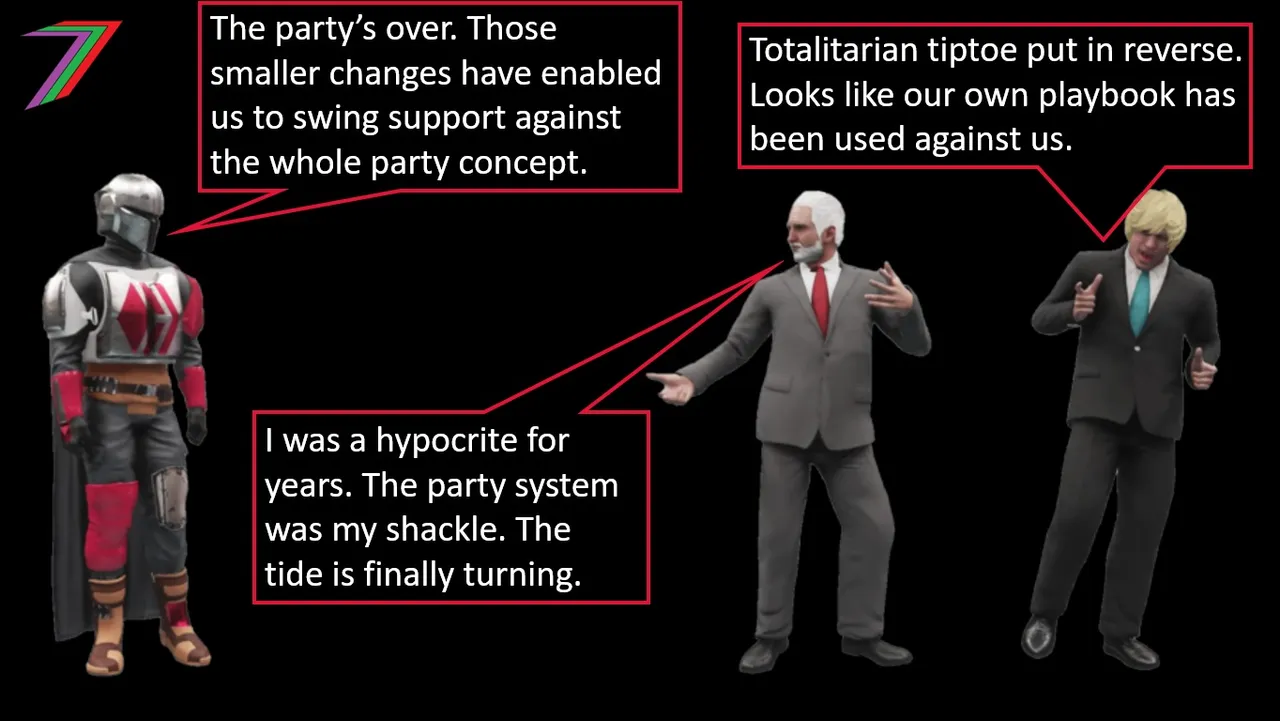
The two-party system is the worst version of representative democracy. However, any version of representative democracy that consists of parties facilitates centralisation of power. This could be because the voting system tends to favour two-parties, party members put allegiance to party politics ahead of the wishes of the people they are supposedly representing, there is a lack of diversity of opinion, and a few people in party leadership positions are easier to manipulate than a large number of unaffiliated people.
The UK and Australia have similar structures to their parties as well as how they operate in Government. Typically, the party that has the most seats forms Government. If they have more than 50% of the seats, the party forms Government by themselves. If they have less than 50%, they form a coalition with small parties that will give them, combined, more than 50% of the seats. To form a collation, the major party often concedes to a few of the small parties demands. However, the smaller parties hold little to no power after Government has been formed.
The second largest party forms the opposition party, the opposition party is given the most prominent position to challenge and debate the Government. Other parties play a much smaller role in debates. A parliament may have hundreds of members but the majority of these members barely openly contribute to debates and when they do, they rarely diverge from the position of the leaders of their party.
Abolishing the party system would enable members of parliament to speak more freely regarding any topic without fear of being reprimanded by party leaders. They can raise and promote issues raised by the people they represent even if these issues do not align with any desired agenda being pushed by senior members.
Governments could consist of any members regardless of where they would have aligned in a party structure. The people could become involved in selecting positions in Government and they would have a wider pool to choose from as they would not be constrained by parties. A government can still function even if every member has a different belief because their responsibility is to implement the wishes of the people that voted them in. Their own expertise would guide them on how that should be done. Lack of affiliation between members should enable more transparency as members are no longer protecting any party image.
Attempting to abolish parties, in our current environment, would face incredible resistance. That is why I believe several other changes need to take place prior to an attempt to abolish parties and the party system. Reduced role of Government will give the people more influence in decision-making. A second chamber of parliament that has no party affiliation can help push the process along. An improved voting system can more effectively elect officials who will more genuinely represent the people. If we ever reach this point, I would fully participate in the election process.
Equal opportunity for exposure for candidates
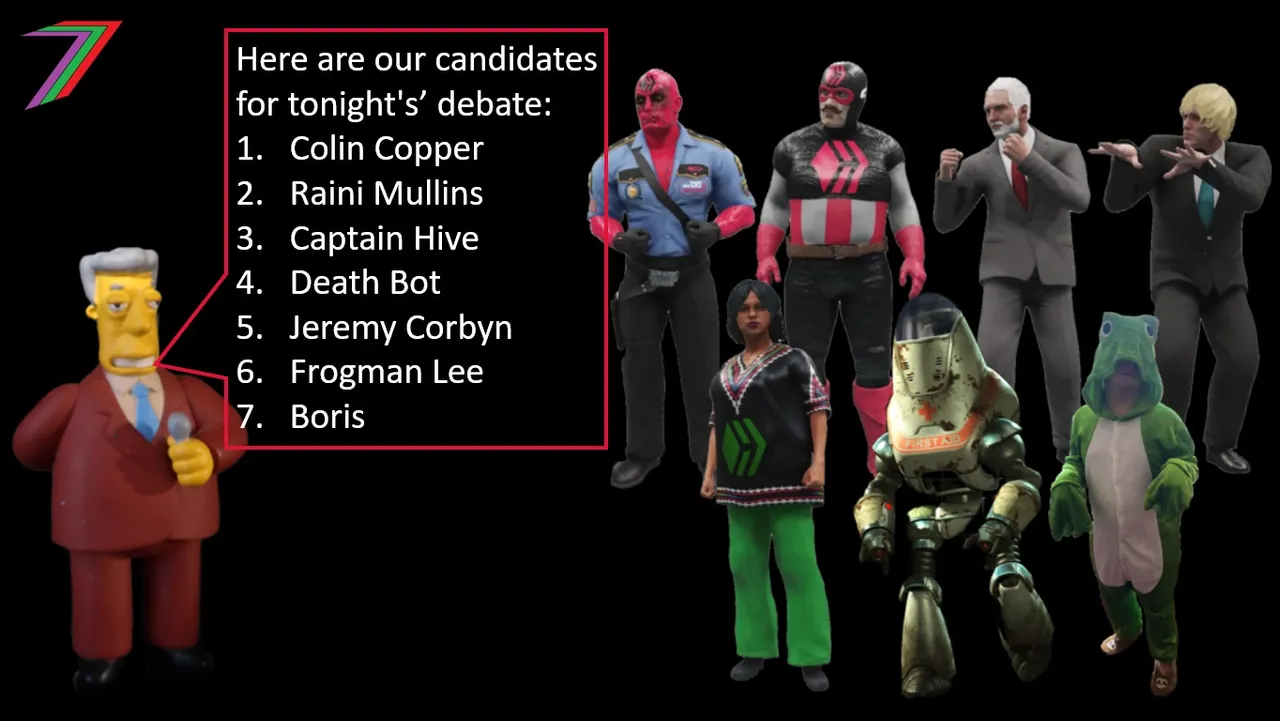
Even if parties are formally abolished, they can still informally exist. The extent of power would be greatly reduced but could remain sufficiently significant to influence policies across various areas of Government. A way to reduce the strength of these informal groups is to make it more difficult for the members of these groups to become elected. This can be done through increased competition for seats and positions in Government. All candidate who can demonstrate a substantial following should be granted equal opportunities for exposure. This would include access to newspaper, televised and radio interviews. Equal opportunities to participate in debates. Equal opportunities to hold rallies and any other promotional and informative events.
Increased competition between candidates will also increase the quality of the candidates and the alignment with the people who will be voting for them. Equal opportunities for exposure will increase overall fairness to the candidates because people cannot support someone if they do not know what they represent. It is a possibility that candidates will waste the exposure they are given but that demonstrates that they would probably be less capable of performing well in an elected position.
Equal opportunities for exposure would be very difficult to achieve as media bias is difficult to prevent. National broadcasting networks could ensure more balanced coverage and independent video streaming platforms can help level the playing field. At this point, I would be fully participating in the election process but I would expect unbiased coverage. If the coverage was biased to the point that the system failed or reverted back to a party system, I would no longer participate in the process.
Reduced role and permanence of representative democracy and positions
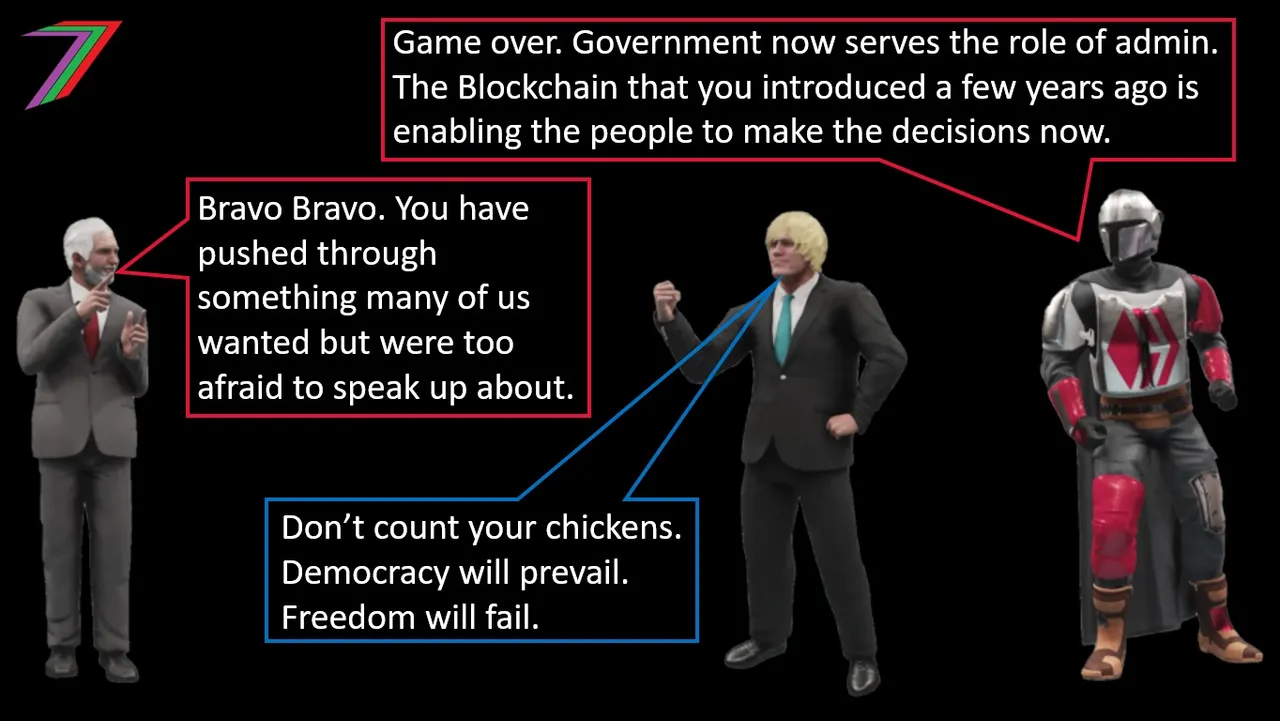
At this point the size and role of Central Government should have been significantly reduced. Local Governments and representatives should have a larger role in decision-making. The next step should involve reducing the leadership role of Government to a mostly administrative role. Decisions should transition from Government to outside of Government. Direct democracy is not possible because it is too inefficient. However, a hybrid version of partial representative democracy and direct public input could become possible with technological advances in areas such as the blockchain, which at this point, should be reasonably well incorporated into Government.
Key decision-makers will not hold permanent positions but instead only play critical roles in decisions they have been assigned. They will be assigned based on consensus from experts and/or selection from the people most affected by the outcomes proposed. My post Blockchain Government – Part 2: Leadership from the Blockchain, outlines how this form of governance may operate. If we reach this stage, if there is very strong public support for such changes a transition will be plausible though it will still face significant and possibly desperate resistance from people who want to continue to hold power.
I would be happy to contribute to voting in a decentralised system where I will be able to vote for something I desire rather than be faced with options that I am completely opposed against. I believe we can all play important roles in shaping our society. This could involve using our expertise to develop solutions, provide information or offer experiences of problems, recognise people who are knowledgeable and talented, inspire others to add value, and any other area, which can help our society reach desired outcomes that enables people to live the lives they want to live.
Supporting the journey
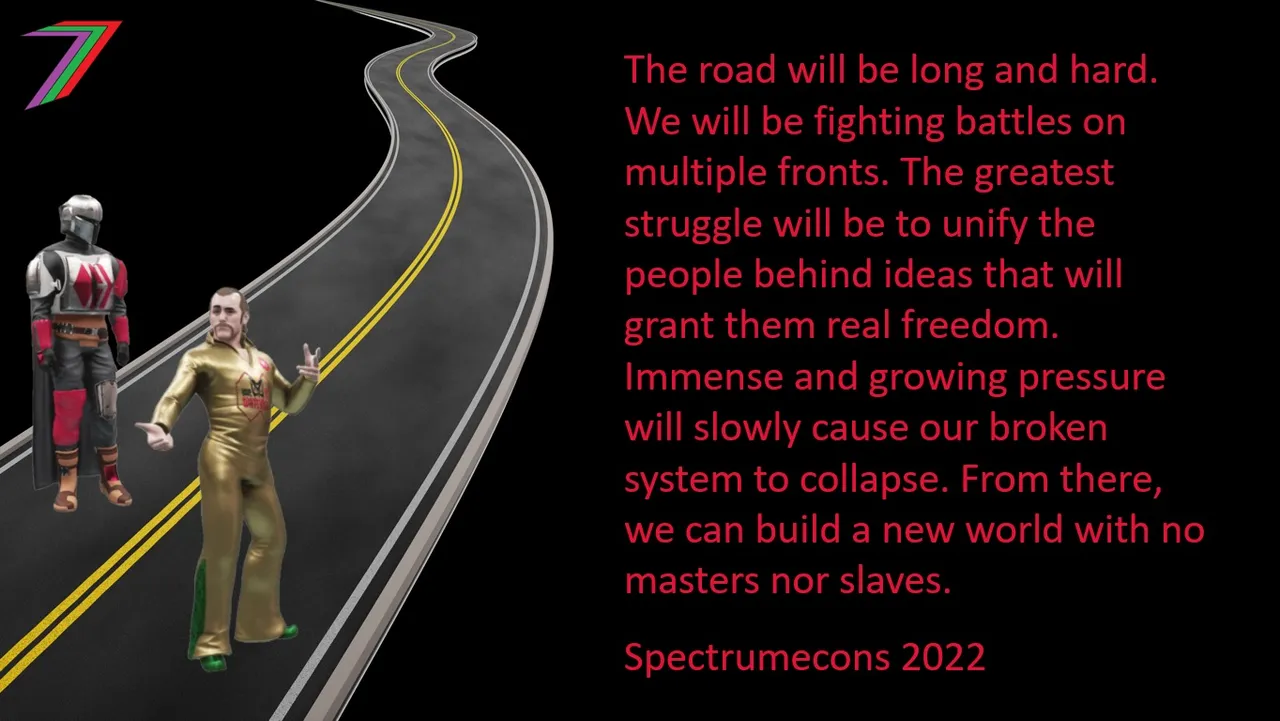
During this long transition period, awareness of the problems of the existing systems need to be continued to be exposed to keep momentum and pressure on Government to gradually make changes to undo the totalitarian march that has progressed for too long. Once that is in motion, pressure needs to be made to change the direction so that we can become a freer society and centralised control becomes more difficult and eventually impossible.
The points outlined in this post are ideas around how we can gradually push change in the right direction. However, this is far from a blueprint or even a strategy but more of general direction. To succeed, good ideas that can plausibly reverse current trends need to gain support. They need to come from people who understand the problems we face and not from one of the many controlled opposition sources. These solutions need to easily resonate with people from many different backgrounds so that they can be pursued with strength.
It is worth noting, though not discussed in this post, resistance will not come from just Government. The whole Establishment will oppose it. They will go to great lengths to maintain the concentration of power within the hands of the few. The media will mock, vilify or refuse to cover those proposing change. Social media will ban ideology that is a threat to the Establishment’s agenda. Big business will attempt to maintain alliances with Governments and prevent new ways of approaching the economy. Banks will resist any alternative decentralised monetary systems that they have little or no influence on.
Progress will appear slow and at times even go backwards. People will get the urge to just want to overthrow the whole system. This would not work. It would be used as an example of radical behaviour and would reverse much of the progress made. Patience is needed as strong support will not emerge overnight. It will slowly grow until it reaches a critical mass, which will enable the formerly impossible to become possible.
So that is what it is going to take for me to get to the ballot box. By that time, it should not be a ballot box but a simple vote cast on my computer using an unhackable decentralised blockchain.
More posts

If you want to read any of my other posts, you can click on the links below. These links will lead you to posts containing my collection of works. These 'Collection of Works' posts have been updated to contain links to the Hive versions of my posts.
Hive: Future of Social Media

Spectrumecons on the Hive blockchain





